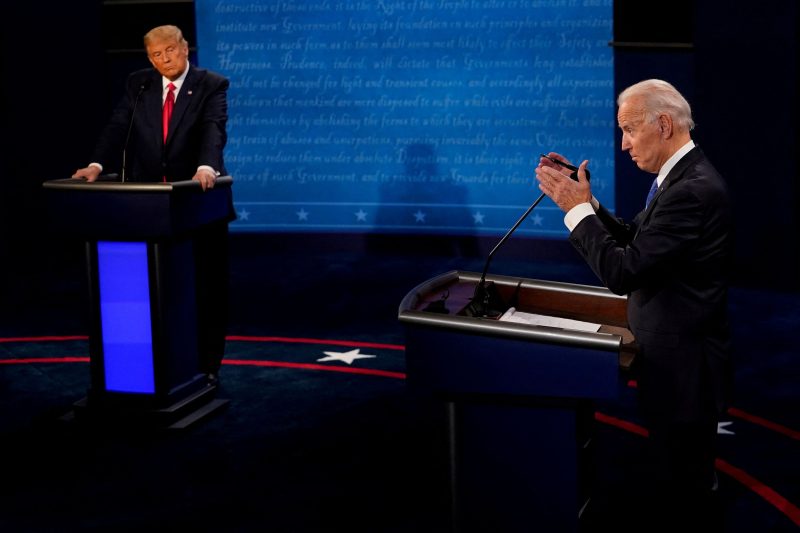June 25, 2024
Can a Debate Shift Voter Sentiment? Let’s Find Out!
 In today's dynamic political landscape, the role of debates in shaping voter sentiment is at the forefront of discussion. The influence of debates in altering the trajectory of voter sentiment remains a subject of great interest and analysis. As the platforms for public discourse and political confrontation, debates offer candidates a platform to articulate their views, challenge opponents, and engage with voters. Let's delve into the dynamics and potential impact of debates on the trajectory of voter sentiment.
Debates serve as a critical juncture in the electoral process, where candidates have the opportunity to present their policy positions, vision, and leadership skills directly to the electorate. The televised nature of modern debates amplifies their impact, reaching millions of viewers and providing a rare moment of direct engagement between candidates and voters. Through rigorous questioning, rebuttals, and exchanges, debates offer voters a window into the character and competence of the contenders, influencing their perceptions and preferences.
The impact of debates on voter sentiment can be profound, as they have the power to shape public opinion, challenge assumptions, and even sway undecided voters. Strong debate performances can boost a candidate's standing, enhance their credibility, and mobilize supporters. Conversely, poor performances or gaffes can damage a candidate's image, erode trust, and alienate potential supporters. The ebb and flow of voter sentiment during and after debates reflect the complex interplay of communication strategies, policy positions, and rhetorical skills.
The trajectory of voter sentiment can be significantly influenced by the tone, substance, and dynamics of debates. When candidates engage in substantive discussions, offer coherent policy proposals, and demonstrate empathy and authenticity, they are more likely to resonate with a broad spectrum of voters. Conversely, divisive rhetoric, personal attacks, or evasion of questions can alienate voters, polarize opinions, and diminish voter confidence. The ability to connect with voters on a personal and emotional level is often as crucial as presenting a strong policy platform.
The impact of debates on voter sentiment is also shaped by external factors, such as media coverage, social media reactions, and post-debate analysis. The framing of debate moments, memorable soundbites, and fact-checking play a crucial role in shaping voter perceptions and reinforcing or challenging candidate narratives. The post-debate period provides an opportunity for candidates to clarify positions, address controversies, and pivot towards key issues that resonate with voters.
In conclusion, debates play a pivotal role in influencing the trajectory of voter sentiment, shaping public perceptions, and informing electoral outcomes. The dynamics of debates, the quality of candidate performances, and the resonance of key messages all contribute to the impact of debates on voter sentiment. While debates are not a singular determinant of electoral success, they remain a critical juncture in the electoral process, where candidates have the opportunity to sway hearts and minds, change narratives, and chart a course towards victory.
In today's dynamic political landscape, the role of debates in shaping voter sentiment is at the forefront of discussion. The influence of debates in altering the trajectory of voter sentiment remains a subject of great interest and analysis. As the platforms for public discourse and political confrontation, debates offer candidates a platform to articulate their views, challenge opponents, and engage with voters. Let's delve into the dynamics and potential impact of debates on the trajectory of voter sentiment.
Debates serve as a critical juncture in the electoral process, where candidates have the opportunity to present their policy positions, vision, and leadership skills directly to the electorate. The televised nature of modern debates amplifies their impact, reaching millions of viewers and providing a rare moment of direct engagement between candidates and voters. Through rigorous questioning, rebuttals, and exchanges, debates offer voters a window into the character and competence of the contenders, influencing their perceptions and preferences.
The impact of debates on voter sentiment can be profound, as they have the power to shape public opinion, challenge assumptions, and even sway undecided voters. Strong debate performances can boost a candidate's standing, enhance their credibility, and mobilize supporters. Conversely, poor performances or gaffes can damage a candidate's image, erode trust, and alienate potential supporters. The ebb and flow of voter sentiment during and after debates reflect the complex interplay of communication strategies, policy positions, and rhetorical skills.
The trajectory of voter sentiment can be significantly influenced by the tone, substance, and dynamics of debates. When candidates engage in substantive discussions, offer coherent policy proposals, and demonstrate empathy and authenticity, they are more likely to resonate with a broad spectrum of voters. Conversely, divisive rhetoric, personal attacks, or evasion of questions can alienate voters, polarize opinions, and diminish voter confidence. The ability to connect with voters on a personal and emotional level is often as crucial as presenting a strong policy platform.
The impact of debates on voter sentiment is also shaped by external factors, such as media coverage, social media reactions, and post-debate analysis. The framing of debate moments, memorable soundbites, and fact-checking play a crucial role in shaping voter perceptions and reinforcing or challenging candidate narratives. The post-debate period provides an opportunity for candidates to clarify positions, address controversies, and pivot towards key issues that resonate with voters.
In conclusion, debates play a pivotal role in influencing the trajectory of voter sentiment, shaping public perceptions, and informing electoral outcomes. The dynamics of debates, the quality of candidate performances, and the resonance of key messages all contribute to the impact of debates on voter sentiment. While debates are not a singular determinant of electoral success, they remain a critical juncture in the electoral process, where candidates have the opportunity to sway hearts and minds, change narratives, and chart a course towards victory.
If you would like to delve into the world of investment topics , go to our partner project Wall Street Wizardry


